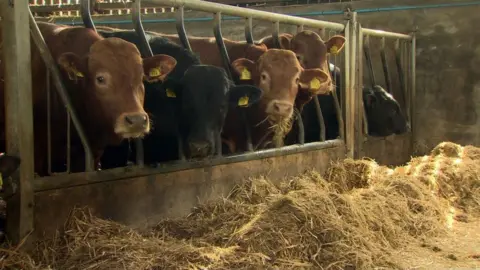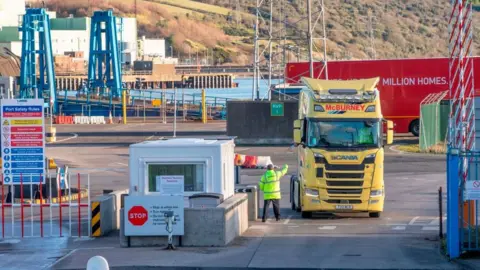Brexit: Northern Ireland vets' strike will affect animal checks at ports
 BBC
BBCA strike by government vets in Northern Ireland next week is set to disrupt the operation of the Irish Sea border.
Union members in the Veterinary Service Animal Health Group (VSAHG) will begin five days of action on Monday, 30 October.
The vets perform controls and checks on animals and some food products entering Northern Ireland from Great Britain.
These controls are mostly a requirement of Northern Ireland's Brexit deal, the Windsor Framework.
The strike will mean some products will need to be shipped through Dublin rather than Belfast.
This will impact some red lane goods - food products entering Northern Ireland from Great Britain which are due to be moved on the Republic of Ireland or which have an uncertain final destination.
These goods have to be checked, while green lane goods which are staying in Northern Ireland are subject to lighter touch processes.
Guidance published by Stormont's Department for Agriculture says that during the strike it cannot guarantee the provision of official controls at inspection facilities at Northern Ireland ports and airports.
 Getty Images
Getty ImagesA spokesperson said: "SPS (agrifood) goods destined for, or at risk of moving to the EU, must enter through an alternative EU SPS inspection facility."
In practice, that will mean these goods will need to be shipped to Dublin or another port in the Republic.
The spokesperson added that goods which will be staying within Northern Ireland can move as usual.
They said: "SPS goods destined to remain within the UK Internal Market (whether travelling under red or green lane arrangements) should continue to move in the same way as they do now.
"These goods must continue to be accompanied by the relevant documentation, will be subject to retrospective checks where necessary and appropriate enforcement if required."
The strike will also impact the movement of livestock - animals moving from Great Britain to Northern Ireland have to be inspected by vets, an arrangement which existed before Brexit.
The guidance says: "Traders intending to move live animals to Northern Ireland during this period should make alternative arrangements or seek to defer the movement of the animals until after the strike has concluded."
It is understood that the department is due to brief traders and hauliers about its contingency plans on Thursday.

What is the green lane/red lane system?
The first thing to understand is that you do not see green and red lanes at NI ports - it is more of a concept than a physical reality.
The basic idea is that goods which are moving through Northern Ireland into the Republic of Ireland and the wider EU will have to use red lane procedures.
That means full customs documentation and checks at the ports for some products.
Goods which are coming from GB to be sold to consumers in Northern Ireland will use the green lane, meaning minimal paperwork and few routine checks
Companies will have to be signed up to a new trusted trader scheme to use the green lane.

